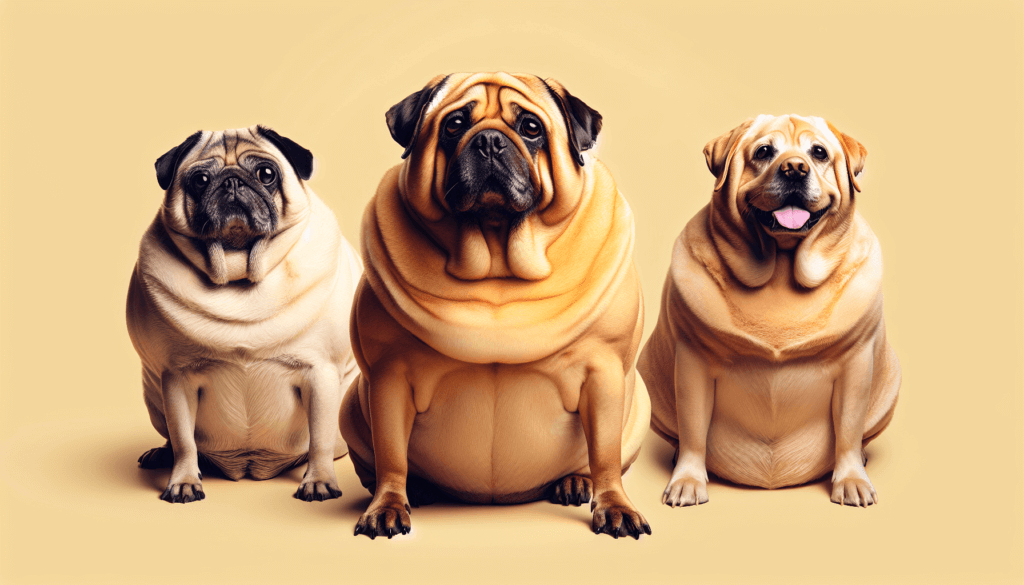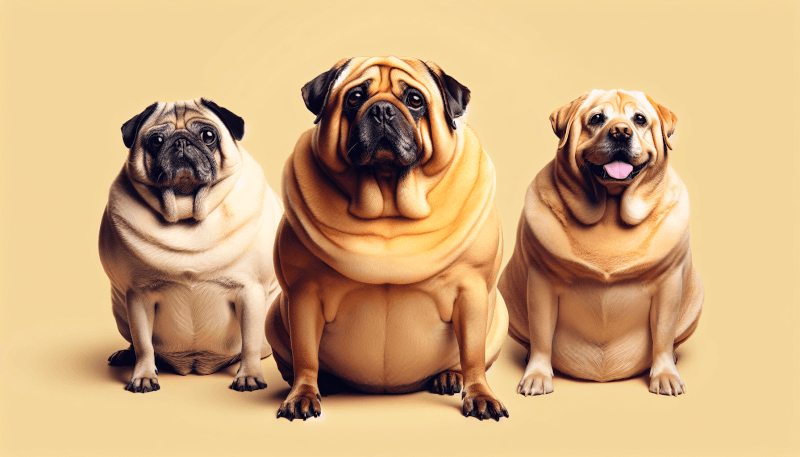Imagine walking down the street and coming across a fluffy, adorable pup that is so big it could easily be mistaken for a small bear. These furry creatures belong to some of the fattest dog breeds in the world! From the massive Saint Bernard to the lovable Basset Hound, these dogs may not fit into the average lap, but they are sure to steal your heart with their charm. In this article, we will take a closer look at some of the fattest breeds and explore what makes them so distinctly cuddly. Get ready to meet some seriously hefty canines!
Obesity in Dogs
Dogs, like humans, are also susceptible to obesity, which can have severe health implications. As a responsible pet owner, it is crucial to understand the causes of obesity in dogs, the health risks associated with it, and how to prevent and manage this condition effectively.
Causes of obesity in dogs
There are several factors that contribute to obesity in dogs. One primary cause is overfeeding or providing an imbalanced diet. Feeding dogs more than their daily caloric requirement can lead to weight gain. Certain dogs may also have a genetic predisposition to obesity, making them more susceptible. Lack of exercise and physical activity is another significant contributor. Just like humans, dogs need regular exercise to maintain a healthy weight.
Health risks associated with obesity
Obesity in dogs can lead to a myriad of health issues. Excess weight puts pressure on a dog’s joints and can lead to arthritis or other joint problems over time. It can also predispose them to respiratory problems, such as difficulty breathing or developing a collapsed trachea. Furthermore, obese dogs are at a higher risk of developing diabetes, heart disease, and even certain types of cancer. It is essential to recognize these risks and take appropriate measures to prevent and manage obesity.
Preventing and managing obesity in dogs
Prevention is key when it comes to obesity in dogs. As a pet owner, you play a crucial role in ensuring your furry friend maintains a healthy weight. Feeding a balanced diet and controlling portion sizes is vital. Consult with your veterinarian to determine the appropriate amount of food for your dog’s breed, age, and activity level. Regular exercise is equally important – aim for daily walks or play sessions to keep your dog active and prevent weight gain. Additionally, providing mental stimulation, such as puzzle toys or interactive games, can help prevent overeating due to boredom.
Factors Influencing a Dog’s Weight
Several factors contribute to a dog’s weight, including genetics, breed predisposition, diet, nutrition, and exercise.
Genetics and breed predisposition
Genetics play a significant role in a dog’s weight. Some breeds, such as Labrador Retrievers and Dachshunds, are more prone to weight gain due to genetic factors. Understanding your dog’s breed-specific traits and potential for weight gain can help you take proactive steps in managing their weight effectively.
Diet and nutrition
Proper diet and nutrition are essential in maintaining a healthy weight for dogs. Feeding them a high-quality diet that meets their nutritional needs is crucial. Avoid overfeeding and resist the temptation to give excessive treats or scraps from the table. Consult with your veterinarian to determine the appropriate diet for your dog’s weight management goals.
Exercise and physical activity
Regular exercise is crucial for dogs to maintain a healthy weight. It helps burn calories, build muscle, and improve overall fitness. Engage your dog in activities that match their energy level and breed characteristics. A daily walk, playtime, or even dog sports can make a significant difference in managing your dog’s weight.

Fattest Dog Breeds
While all dogs can be prone to obesity, certain breeds are more susceptible due to their genetic makeup and specific characteristics. Here are the top five fattest dog breeds and the underlying factors contributing to their propensity for weight gain.
1. Labrador Retriever
Originating from Newfoundland, Labrador Retrievers were bred to assist fishermen and retrieve game. Their energetic nature and love for food can make them prone to weight gain if not properly managed. Labradors have a tendency to overeat, often accepting treats and extra meals without hesitation. This breed’s insatiable appetite, coupled with a lower metabolism, increases the risk of obesity and related health issues.
2. Dachshund
Dachshunds, also known as Wiener Dogs, have a distinctive body shape with short legs and a long body. Their elongated torso makes them prone to weight gain as excess weight puts strain on their spinal column, leading to back problems and intervertebral disc disease. Additionally, Dachshunds can be less active due to their short legs, making it challenging to burn off excess calories.
3. Bulldog
Bulldogs are known for their distinctive appearance, characterized by their stocky build and wrinkled face. Despite their muscular physique, they are prone to weight gain due to their love for food and lower activity levels. Bulldogs have a tendency to tire quickly, which makes it harder for them to engage in extended physical activity. Additionally, their brachycephalic (flat-faced) structure can lead to breathing difficulties when carrying extra weight.
4. Basset Hound
The Basset Hound is a breed known for its short legs and long body. This unique body shape can make weight management challenging. Their low activity levels, combined with excessive calorie intake, increase the risk of obesity. Moreover, Basset Hounds are prone to ear and skin problems, and obesity can exacerbate these issues, making it crucial to maintain a healthy weight.
5. Saint Bernard
Saint Bernards are giant breed dogs known for their massive size and friendly nature. As they have a slower metabolism compared to smaller breeds, they are more prone to weight gain. Special attention should be given to their dietary needs to avoid excessive weight gain, which can further strain their joints. Maintaining a healthy weight is essential in preventing joint issues and ensuring their overall well-being.
Preventing Obesity in Dogs
Preventing obesity in dogs requires a proactive and mindful approach. Here are some key strategies to help prevent and manage weight gain in your beloved furry companion:
Feeding the right diet and portion control
Consult with your veterinarian to determine the appropriate diet for your dog’s specific needs. Choose a high-quality dog food that provides all the necessary nutrients without excessive calories. Pay attention to portion sizes and avoid free-feeding or leaving food out all day. Use measuring cups to ensure accurate portion control and resist the temptation to give extra treats or table scraps.
Providing regular exercise and mental stimulation
Regular exercise is crucial for dogs to maintain a healthy weight and overall fitness. Engage in activities that match your dog’s energy level and breed characteristics. A daily walk, playtime, or interactive games can help burn excess calories and keep your dog physically and mentally stimulated. Mental stimulation, in the form of puzzle toys or training sessions, can also prevent overeating due to boredom.
Avoiding excessive treats and human food
Treats should be used sparingly and given as rewards for good behavior or during training. Opt for healthy, low-calorie treats or use a portion of your dog’s daily food allowance as treat substitutes. Avoid feeding them excessive amounts of human food, as this can contribute to weight gain and lead to unhealthy eating habits.
Conclusion
Understanding the risks of obesity in dogs is crucial for pet owners. By recognizing the causes, health risks, and preventive measures, you can ensure your furry friend maintains a healthy weight and enjoys a long, fulfilling life. The responsibility lies with pet owners to provide a healthy diet, regular exercise, and mental stimulation to promote overall well-being. By taking these proactive steps, you can help your furry companion live their best life and avoid the detrimental effects of obesity.


